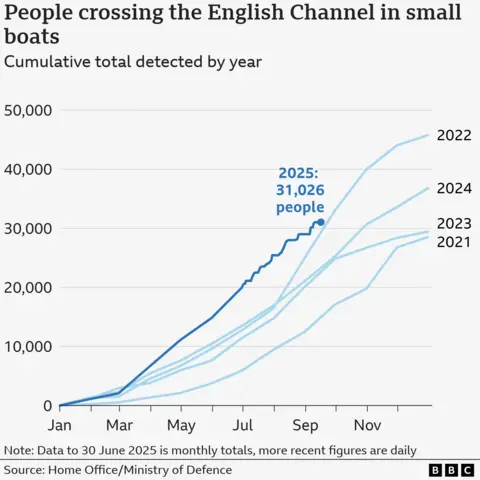Migrant returned to France after government wins court challenge

Dominic Cascianihome and legal correspondent and
Will Vernonin Paris
An Eritrean man has been flown out of the UK under the government’s “one in, one out” deal with France, after a last-minute court bid to delay the departure failed.
The Home Office tightened the rules around human trafficking claims to win Thursday’s case – the first time ministers won a legal challenge that led to an immediate removal under the scheme.
Earlier this week, the removal of another migrant was temporarily blocked, though later an Indian national did become the first person to be sent to France under the pilot scheme, in a case without a legal challenge.
The UK and France have agreed a year-long scheme of exchanges of migrants to deter small boat crossings – although three more boats were seen leaving France on Friday morning as winds eased.
Friday’s flight saw the man accompanied by Home Office officials on an Air France flight from Heathrow Airport and handed over to police in Paris.
He told the BBC he felt “very bad” to be back in France, and when asked what he intended to do now, said “I don’t know” before being led away to a separate part of the airport.
French officials told the BBC he would be taken to a migrant accommodation centre. Under French rules, he will have eight days to either claim asylum in France or return to his home country.
The “one in, one out” deal is intended to deter people from turning to smugglers to cross the Channel because of the risk they could be sent back.
It proposes that, for each migrant the UK returns to France, another migrant with a strong case for asylum in the UK will be allowed to come in return, the first of whom is expected in the coming days.
Trade Secretary Peter Kyle told BBC Breakfast this week’s removals were “the first steps and we will be ramping up from here”.
But he refused to comment on how many people the UK hoped to remove, saying: “We’re not going to put a number that would cap our ability to get a grip on this situation.”
 Getty Images
Getty ImagesThe Eritrean man removed on Friday arrived in England on a small boat in August, and told an emergency High Court hearing he had fled his home in 2019 because of forced conscription.
He said he spent time in Ethiopia, South Sudan and Libya before coming to Europe, where he slept rough in France before making his way to Dunkirk.
The second removal of a migrant to France is legally far more significant for the government’s strategy than the failure on Tuesday to win permission for a flight to leave.
In that case, a 25-year-old Eritrean man won a temporary reprieve because the Home Office slavery assessment team, who rejected his case, said he could make further representations.
Home Secretary Shabana Mahmood then told officials to make clear that anyone who has been turned down for protection as a victim of slavery could continue their claim after being put on a flight to a safe country.
That saw the court rule there was no reason to stop Friday’s removal flight. The judge, Mr Justice Sheldon, said France was a safe country abiding by the same safeguards as the UK under the European Convention of Human Rights.
He said there was no evidence that a migrant sent there would be treated unfairly – and if he were, he had a legal route to return to the UK by continuing his claim from there.
The ruling was in stark contrast to the failed £700m Rwanda plan under the last government, in which the Supreme Court ruled that the African country could not be considered to be safe at all, because of human rights abuses.
The judge then added that it was in the public interest for the flight to depart because it was part of a policy to disrupt criminal smuggling gangs who were posing a serious risk to life.
His ruling strengthened the Home Office’s hand and added to another so-far unreported case from last week. In that earlier one, a specialist immigration tribunal judge said there was no evidence that France would not properly treat and care for victims of trafficking. The case concerns a stateless Palestinian who arrived on a small boat in August but as of Friday, had had not yet been put on a flight.

On Thursday, US President Donald Trump weighed in on illegal immigration to the UK at the end of his state visit.
During a press conference with Prime Minister Sir Keir Starmer, he suggested using the military to combat small boat crossings.
Sir Keir countered by affirming that the UK had “a number of cooperation deals with other countries” in place and that the government is taking the issue “incredibly seriously”.
Kyle said there was already a “functional relationship” between the navy and UK Border Force.
He added: “What we really need at the minute is our military focus on all those key issues around the world directly relating to our national defence”.
Neither the UK or French governments have suggested the plan will smash the crossings on its own.
Around 100 men are currently in immigration removal centres near Heathrow under the scheme. Each one was detained after arriving in the UK on a small boat and told they were potentially eligible to be returned to France.
Around 5,590 migrants have reached the UK since the scheme came into effect at the start of August.
Source link


